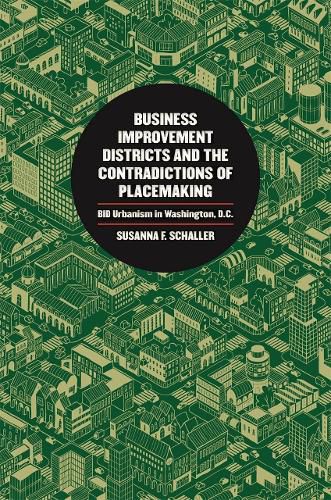Readings Newsletter
Become a Readings Member to make your shopping experience even easier.
Sign in or sign up for free!
You’re not far away from qualifying for FREE standard shipping within Australia
You’ve qualified for FREE standard shipping within Australia
The cart is loading…






The
livable city,
the
creative city,
and more recently the
pop-up city
have become pervasive monikers that identify a new type of urbanism that has sprung up globally, produced and managed by the business improvement district and known colloquially by its acronym, BID. With this case study, Susanna F. Schaller draws on more than fifteen years of research to present a direct, focused engagement with both the planning history that shaped Washington, D.C.‘s landscape and the intricacies of everyday life, politics, and planning practice as they relate to BIDs. Schaller offers a critical unpacking of the BID ethos, which draws on the language of economic liberalism (individual choice, civic engagement, localism, and grassroots development), to portray itself as color blind, democratic, and equitable.
Schaller reveals the contradictions embedded in the BID model. For the last thirty years, BID advocates have engaged in effective and persuasive storytelling; as a result, many policy makers and planners perpetuate the BID narrative without examining the institution and the inequities it has wrought. Schaller sheds light on these oversights, thus fostering a critical discussion of BIDs and their collective influence on future urban landscapes.
$9.00 standard shipping within Australia
FREE standard shipping within Australia for orders over $100.00
Express & International shipping calculated at checkout
The
livable city,
the
creative city,
and more recently the
pop-up city
have become pervasive monikers that identify a new type of urbanism that has sprung up globally, produced and managed by the business improvement district and known colloquially by its acronym, BID. With this case study, Susanna F. Schaller draws on more than fifteen years of research to present a direct, focused engagement with both the planning history that shaped Washington, D.C.‘s landscape and the intricacies of everyday life, politics, and planning practice as they relate to BIDs. Schaller offers a critical unpacking of the BID ethos, which draws on the language of economic liberalism (individual choice, civic engagement, localism, and grassroots development), to portray itself as color blind, democratic, and equitable.
Schaller reveals the contradictions embedded in the BID model. For the last thirty years, BID advocates have engaged in effective and persuasive storytelling; as a result, many policy makers and planners perpetuate the BID narrative without examining the institution and the inequities it has wrought. Schaller sheds light on these oversights, thus fostering a critical discussion of BIDs and their collective influence on future urban landscapes.